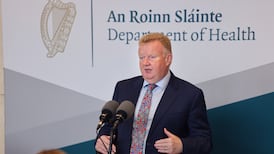Despite welcoming the appointment of Mary Harney, the INO looks back at the last year with "a genuine and sincere sense of disappointment", according to Liam Doran.
The Minister had walked away from the financial commitment needed to underpin the health and primary care strategies, he said.
Noting that many of the ills of the health service were not the fault of the Minister, Mr Doran, however, expressed disappointment that interest in these strategies was replaced with a zeal for reform. "The INO welcomed the health reform programme in the context of reduced bureaucracy, speeded-up decision-making, empowerment of front-line staff and delivery of patient-centred services. However, the handling of it has been an unmitigated disaster."
On a positive note, Mr Doran welcomed Ms Harney's commitment to giving limited drug prescription rights to nurses and midwives. The decision to fund direct entry to midwifery and paediatric nursing training from next September was an excellent move, he said."However, one year after her appointment, despite the 10-point A&E plan, it is still as bad as ever, if not worse."
Stephen McMahon, chairman of the Irish Patients Organisation (IPA):
It was a year of mixed progress, according to Stephen McMahon. Judgment of the Minister's performance must not be clouded by focusing solely on the high-profile issues, and it was clear that progress was being made, he said.
"The patient is the key person in any healthcare system and everything should be measured by the treatment they receive."
The Minister inherited the current A&E problem, according to Mr McMahon, and there has been significant investment in this issue, such as investment in primary care and the established the 10-point plan. However, there were still up to 300 patients a day on trolleys in A&E departments and research showed that 11 per cent of patients were waiting 12 hours or more to get a bed and some were receiving all their treatment on a trolley, he said.
The Minister also seems to be committed to tackling the acquired-hospital infection and MRSA issue, according to the IPA.
The Minister has demonstrated that "she has real grit" and the real test will be the delivery of all the initiatives in 2006 that she started in 2005, according to the IPA.
John McCormack, chief executive officer of the Irish Cancer Society (ICS):
The good news this year was the Minister's announcement of plans for a national network of radiotherapy service, according to John McCormack. However, more commitments on the delivery of these services were needed, he said. "Up to now there has been a complete failure to invest in proper radiotherapy services in Ireland. Fifty per cent of people who get cancer need radiotherapy but only 30 per cent in Ireland are receiving it."
In 2005 we were very disappointed with the Minister's failure to move on a cervical cancer screening programme. In 2006 the ICS is looking forward to the implementation of BreastCheck, as promised by the Minister. "For every 1,000 women screened this excellent programme will pick up seven cancers," he said. A screening programme for prostrate and colorectal cancer also needed to be considered, he added. The Minister has not been very strong in the area of early detection and prevention, according to ICS. For example, a total ban on sun-beds was needed, he said.
The society was disappointed that there was no increase in the price of cigarettes in the Budget.
Michael Ringrose, chief executive of People with Disabilities in Ireland (PwDI):
There is no doubt but that the Minister for Health is deeply committed to achieving better outcomes from the health services, according to Mr Ringrose. The difficulty, however, was that "when it comes to disability she is dealing with decades of severe neglect", he said.
The establishment of the HSE gave hope that at least some of the archaic practices would be changed, he said. PwDI was encouraged that the HSE's manager for disability services, James O'Grady, recognised the need for radical change, promising a real and determined effort to link the HSE more effectively with the end user, he added.
However, the Minister would have to be vigilant, he warned. The national disability strategy launched in September 2004 promised an extra €1.3 billion across Government departments up to 2009. However, a recent Health Research Board report found that this is inadequate, particularly with respect to people with intellectual disabilities. The two critical issues for PwDI are the co-ordination of services across government departments and the implementation of quality standards for the delivery of services. Progress so far was disappointing, Mr Ringrose said.
Dr Asam Ishtiaq, president of the Irish Medical Organisation (IMO):
Mary Harney has done well in her fire-fighting role at the helm of a difficult ministerial portfolio, according to Dr Ishtiaq. However, she has antagonised the medical profession by her tough talking, has caused undue anxiety among users of the hospital by her off-the-cuff remarks on hygiene and has demoralised staff, he said.
Disappointments in 2005 include failure to fully implement the 10-point A&E action plan, the continuing A&E crisis, lack of movement on the primary care strategy and the fact that waiting lists to get on waiting lists are getting longer.
The Minister has "failed dismally" to fulfil the pledge to deliver an additional 200,000 medical cards. Instead "doctor-only" medical cards were provided, which means that many thousands of people on subsistence incomes cannot get basic medical care covered by the State.
Leaving aside the urgent need for funding to tackle the crises throughout the service, the Budget allocation of a 9 per cent increase in health allocation was "insufficient", when viewed alongside medical inflation running at 9 per cent, Dr Ishtiaq concluded.








